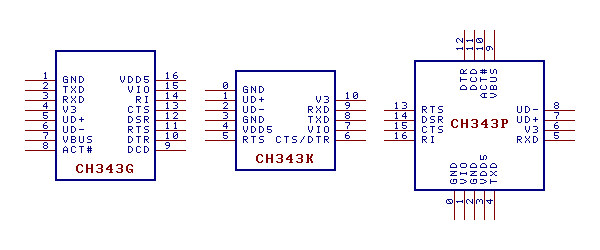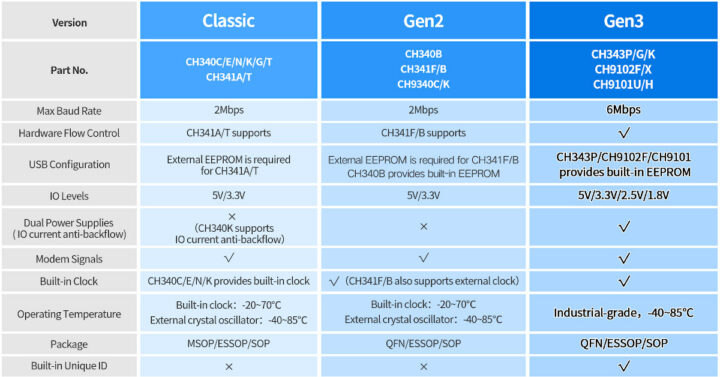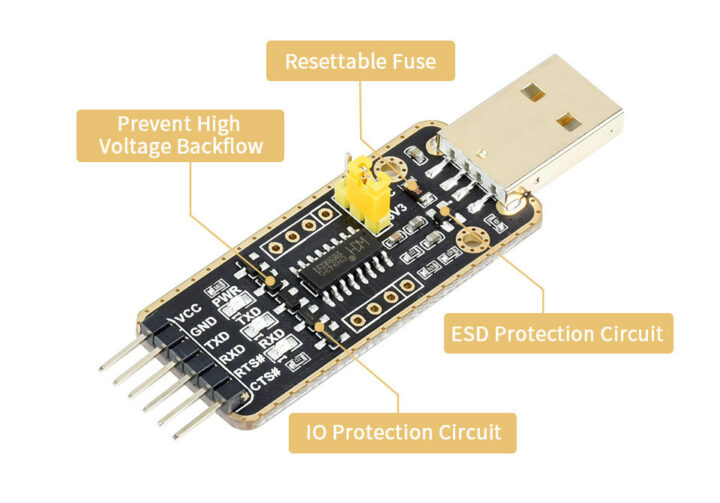WCH CH340 family of USB to serial chip is very popular, and often found on development boards for debugging/access to the serial console, but the company has now introduced the CH343 “Gen3” chip – just like CH9102F apparently – with a higher 6 Mbps baud rate, support for 1.8V, 2.5V, 3.3V, and 5V IO voltage, and the ability to request custom USB VID/PID numbers.
Three variants exist with CH343P, CH343G, and CH343K with different packages: QFN16, SOP16, and ESSOP10 respectively. CH343P contains an EEPROM for easy customization, while CH343G and CH343K PID/VID can still be customized for larger orders.
 CH343 key features and specifications:
CH343 key features and specifications:
- Full-speed USB 2.0 device interface
- Hardware full-duplex serial UART interface with baud rate varies from 50bps to 6Mbps.
- Automatic identification and dynamic adaptation of common communication baud rate of 115200bps and below.
- Supports 5, 6, 7, or 8 data bits, as well as odd, even, space, mark, and no parity.
- MODEM interface signals: RTS, DTR, DCD, RI, DSR, and CTS.
- Supports CTS and RTS hardware automatic flow control.
- Supports half-duplex, status TNOW, used for controlling RS485 transmit-receive switch.
- Supports RS232 through an external voltage conversion chip.
- CH343P integrates EEPROM used to configure the chip of VID, PID, maximum current value, product information string, etc.
- Integrated Unique ID (USB Serial Number).
- Integrated 12MHz clock, no external crystal required.
- Power Management
- USB port 5V and 3.3V power supply.
- I/O independent power supply with 5V, 3.3V, 2. 5V, and 1.8V
- Integrated power-on-reset
- RoHS compliant SOP-16, ESSOP-10 and QFN16 lead-free package.
- Temperature Range – -40 to +85°C
The chip works with USB CDC drivers, and it should not need additional drivers on Windows, Linux, Mac, and Android. You’ll find more details in the datasheet, and on Twitter where Patrick Yang, Technical Director at WCH, often shares information about new products, and answers some technical questions.
WCH CH343G can be purchased on LCSC for just under $1 in single units, or around 55 cents per unit for 100+ orders. Waveshare is also selling a USB to serial board based on CH343G for about $4 with either a USB Type-C, Type-A, Micro USB, or mini USB port.

Jean-Luc started CNX Software in 2010 as a part-time endeavor, before quitting his job as a software engineering manager, and starting to write daily news, and reviews full time later in 2011.
Support CNX Software! Donate via cryptocurrencies, become a Patron on Patreon, or purchase goods on Amazon or Aliexpress






